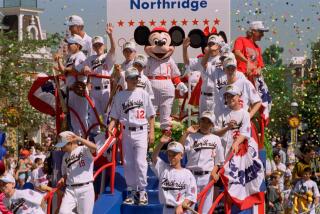Greece Is the Word for These Minor Leaguers
- Share via
Twenty-four years ago, an American team emerged from obscurity and shocked the world at the Winter Olympics. With the U.S. hockey team’s victory over the Soviets in mind and the 2004 Summer Games coming up, the spotlight turns now toward a new group of Americans hoping to shine, this time on the baseball diamond in Athens:
* At third base, Clay Bellinger, former New York Yankee utility man. Bats right, throws right. Makes his off-season home in Chandler, Ariz. * Coming in from the bullpen, lefty Sean Spencer. Born in Seattle, raised across the sound in Port Orchard, Wash. Muses about the thrill of walking in the opening ceremony on Aug. 13, six months from today, saying, “You want to have the video camera ready to go when you walk in there.”
* And from San Diego way, right-handed pitcher Alex Cremidan. A UC San Diego grad (economics, 2003), Cremidan says, “Competition ... is what fires me up.”
They make movies about this sort of stuff.
Except these guys won’t be playing for Team USA in Athens. The U.S. baseball team, improbably, did not qualify for the Olympics. These guys will be playing for the home team, Greece.
“It’s ‘Man of La Mancha.’ Or ‘Field of Dreams.’ Or ‘Cool Runnings.’ It’s 19 stories at once,” said Thomas J. Miller, the U.S. ambassador to Greece and one of the most ardent supporters of the Greek baseball enterprise.
As the host country, Greece has to field a baseball team. But what seemed years ago to be a bad joke has become a serious quest. The Greek American management of the Baltimore Orioles has spent years and thousands of dollars scouring the States for talent with some sort of ancestral tie to Greece.
Now it has the makings of a team. Made up mostly of minor leaguers such as Spencer and Cremidan, it is seasoned with the likes of Bellinger, big league fringe players expected to provide steadiness.
Do you believe in miracles? Yiasis!
That’s often the first Greek word visitors to Athens hear. Roughly translated, it means, “Hello to everyone!” And the attention sure to be lavished in the coming months on the 2004 Greek team may also prove instrumental in saving baseball for the Games.
The International Olympic Committee, concerned about the absence of big-name U.S. major leaguers in the Games, has signaled an intent to remove baseball from the Olympic program after Athens.
Unlike in basketball, there will be no U.S. baseball Dream Team at the Games, Major League Baseball’s having shown no interest in interrupting the 162-game regular season.
Team USA, made up mostly of minor leaguers, lost in November to Mexico in Olympic qualifying.
“All the Americans are on the Greek team,” former Dodger manager Tom Lasorda, who managed the 2000 U.S. team to gold, said this week with a rueful laugh. Team Greece’s tale also highlights one of the most entertaining aspects of the Games, the tradition of nation-swapping when it suits the nation and the team or players involved.
The IOC’s rules require that any competitor “be a national” of the country entering that competitor. But in practice, and in the case of the Greek baseball team, that means having, or obtaining, a Greek passport.
“Most of [the players] like myself are just happy to be able to kind of go back to our roots and get back to our heritage,” said shortstop Nick Theodorou, 28, of Rialto. His mother, Georgia, was born in Greece, as was his paternal grandfather. “I say I’m a first-and-a-half generation [American], if that makes any sense,” said Theodorou, a Dodger farmhand and 1998 UCLA graduate.
For Theodorou and many of the other Americans bound for Team Greece, their ties to the old country were cemented in childhood.
Theodorou, for instance, is named for his maternal grandfather, Nickolaos Maroutsos, who in 1955 left the Greek village of Ahladokambos for the United States. Four years later, he sent for his family. Four years after that, they all moved to California.
“I’m an American first,” Theodorou said. “Obviously, I won’t say I’m not. But I’m an American with Greek heritage.”
The challenge of fielding a Greek team became apparent soon after Athens was awarded the 2004 Games in 1997.
“Everybody says, ‘What is baseball? We have not players. We have not fields,’ ” said Panos Mitsiopoulos, who runs a hotel in Athens’ tourist-friendly Plaka district and is president of the Greek baseball federation.
Enter Peter Angelos, the Greek American owner of the Baltimore Orioles.
His son, Lou Angelos, a Baltimore lawyer and consultant to the club, said of the team’s decision to get involved, “I think there were some reservations earlier, to take a team largely comprised of Greek Americans to play for Greece. Is that in keeping with the spirit of the Olympics? And I think it is.
“This is exactly what the Olympics are all about, diverse backgrounds and people coming together through sport, bridging whatever issues that at the time may separate people.”
The Orioles have since contributed about $750,000 to the project, Lou Angelos said.
A key hire was Rob Derksen of Hales Corners, Wis., who was named team manager. Derksen has no Greek roots but does have extensive experience in international baseball, having helped oversee Australia’s 1996 Olympic team (seventh place) and Guam’s bid to play in the 2000 Games (lost in qualifying to South Africa).
Since 2001, Derksen has been traveling the United States and Canada, searching for baseball talent.
“The Greek families are very proud,” he said. “When I talk to the dads, they’d say, ‘I have the next Babe Ruth or Cy Young here.’ ... You don’t know till you see.
“You talk about your big fat Greek wedding, they want to cook, they want to invite you over for dinner. It was a really neat experience for me.”
By 2002, Derksen had found some players. The 2002 version of Team Greece won the European Pool B championships in Hungary, defeating Slovakia for the gold, 16-3. That earned Team Greece a berth in the Pool A championships last summer in the Netherlands.
There, Team Greece made it to the finals before losing, 2-0, to a Dutch team headed by former Dodger manager Davey Johnson.
That experience made clear three lessons:
* One, as pitcher Spencer said, “There’s no halfway out there. You’re going full bore the full time. You lose one game, that’s it. In a [typical U.S.] baseball season, you have 100-some games. In these international competitions, you have eight games. That’s maybe it.”
* Two, Team Greece was still a work in progress.
Eric Karros, a former Dodger, would have been perfect, Derksen said. But Karros recently signed to play this season for Oakland.
Derek Nicholson, 27, of Redondo Beach, a Detroit Tiger prospect and The Times’ 1993 South Bay player of the year, probably will go to Athens, if he can prove he has Greek blood. His father, the family story goes, was born to a Greek mother who then gave him up for adoption.
“We gave [Derksen] my father’s birth certificate, and they’re working on it,” he said.
* Three, like the 1980 U.S. hockey team, which warmed up for the Lake Placid Olympics with a series of exhibition games, Team Greece needs work before Athens.
Plans are in the works for games in early August in Toronto against Team Canada, followed by a tournament in Baltimore with the Canadian, Dutch and Australian teams, Derksen said.
After that, it’s off to Greece and the Games.
And then?
“When you think about the major leagues and you look at the teams the last couple of years, who has won the World Series?” asked Miller, the U.S. ambassador.
“Longshots.”
More to Read
Go beyond the scoreboard
Get the latest on L.A.'s teams in the daily Sports Report newsletter.
You may occasionally receive promotional content from the Los Angeles Times.






